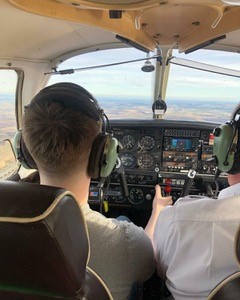AN INVESTIGATION has been carried out to see if general aviation (GA) pilots would still take off if they were under stress.
General aviation is the most dangerous category of flight in the UK as these pilots frequently fly alone, unlike commercial aviation pilots.
Risk perception and management are therefore key areas of research vital to improve safety in this group.

Research from the University of Aberdeen has found that GA pilots do not consider stress to be as great a risk to flight safety.
A team of researchers from the Applied Psychology and Human Factors department wanted to examine the risk perception of GA pilots and how this impacts their decision-making.
They wanted to find out if factors like stress impacted their decision to deciding whether it is suitable, and safe, to take-off or not.
The study indicated that GA pilots were more likely to take off than not in scenarios involving a pilot under stress, or missing equipment such as checklists or sunglasses.
However, they were less likely to proceed in scenarios depicting a pilot who was ill, an aircraft with a faulty air speed indicator, or a faulty seatbelt.
Postgraduate researcher Nejc Sedlar said : “The idea behind the study was to determine whether GA pilots viewed all the various categories of risk as equally risky, or whether certain types of risk might be more likely to be ignored or managed in favour of a positive take-off decision.”

The team presented 101 pilots with a series of 12 take-off scenarios across four different categories including, compromised performance, environmental hazards, faulty equipment and missing equipment.
The Pilots were then asked if they would proceed in each scenario and to explain their reasoning.
Dr Amy Irwin who led the study stated that: “The results suggest that not all of our scenarios were judged to be equally risky.”
“The pilots’ reasoning for their decisions suggests that although they were aware of the risks of flying while ill or tired, the pilots considered flight to be a stress relieving activity, and so they were less likely to cancel a flight based on being under stress.”
“This is despite guidance from aviation regulatory bodies such as the Federal Aviation Authority indicating that stress can potentially compromise flight performance.”
“GA pilots are generally safety conscious, but not all risks are considered equal, so it is important to highlight the potential impact of stress on flight safety going forward to encourage pilots to consider the risks of flying stressed.”
The research carried out indicates that training on the impact of stress on cognition and performance would be useful for pilots to have going forward.

